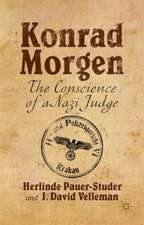Wartime Schooling and Education Policy in the Second World War: Catholic Education, Memory and the Government in Occupied Belgium
Autor Sarah Van Ruyskensveldeen Limba Engleză Hardback – 30 aug 2016
Preț: 387.96 lei
Nou
Puncte Express: 582
Preț estimativ în valută:
74.24€ • 76.59$ • 61.95£
74.24€ • 76.59$ • 61.95£
Carte tipărită la comandă
Livrare economică 26 martie-09 aprilie
Preluare comenzi: 021 569.72.76
Specificații
ISBN-13: 9781137520104
ISBN-10: 1137520108
Pagini: 224
Ilustrații: XII, 220 p.
Dimensiuni: 148 x 210 x 18 mm
Greutate: 0.41 kg
Ediția:1st ed. 2016
Editura: Palgrave Macmillan UK
Colecția Palgrave Macmillan
Locul publicării:London, United Kingdom
ISBN-10: 1137520108
Pagini: 224
Ilustrații: XII, 220 p.
Dimensiuni: 148 x 210 x 18 mm
Greutate: 0.41 kg
Ediția:1st ed. 2016
Editura: Palgrave Macmillan UK
Colecția Palgrave Macmillan
Locul publicării:London, United Kingdom
Cuprins
Chapter 1. Introduction: A Political History of Belgian Education during the Second World War.- Chapter 2. Between Pacification and Conflict: The History of Belgian Education and the Challenge of National Socialism.- Chapter 3. Towards a Gleichschaltung of Belgian Education: The German Education Policy and the Contacts between the Military Administration and the Belgian Roman Catholic Church.- Chapter 4. War in the Classroom: The Development of Catholic School Culture during World War II in Belgium.- Chapter 5. A School Trip Down Memory Lane: Teacher and Pupil Memories of World War II in Belgium.- Chapter 6. Catholic Schools during World War II: Victims of German Indoctrination?.
Notă biografică
Sarah Van Ruyskensvelde is a post-doctoral fellow at theKatholieke Universiteit Leuven, Campus Kulak, Belgium.
Textul de pe ultima copertă
This book deals with the development of private secondary schooling during the Second World War in Belgium. It focuses on how the German occupier used education to gain acceptance of the regime, and discusses the attitudes of Belgian education authorities, schools, teachers and pupils towards the German occupation. Suggesting that the occupation forced Belgian education authorities, such as the Roman Catholic Church, to take certain positions, the book explores the wartime experiences and memories of pupils and teachers. It explains that the German Culture Department was relatively weak in establishing total control over education and that Catholic schools were able to maintain their education project during the war. However, the book also reveals that, in some cases, the German occupation did not need total control over education in order to find support for some authoritarian ideas. As such, Van Ruyskenvelde’s analysis presents a nuanced viewof the image of the Catholic Church, schools, teachers and pupils as mere victims of war.
Sarah Van Ruyskensvelde is a post-doctoral fellow at the Katholieke Universiteit Leuven, Campus Kulak, Belgium.






